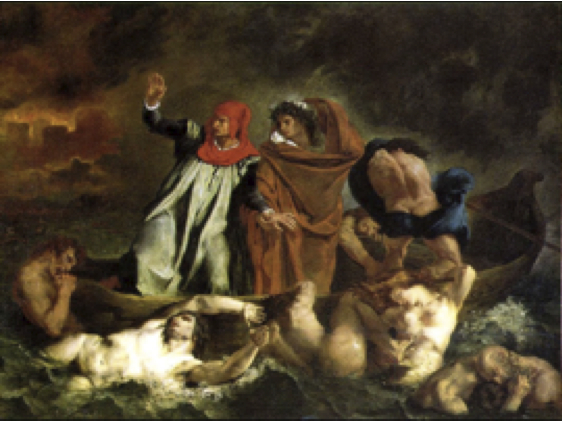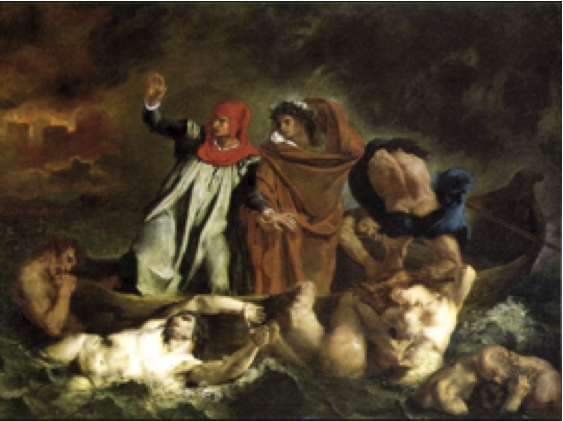A Pessimist for Peace, And the Question of a Just War

DATELINE, SEPTEMBER 16, 2013
“The hottest places in Hell are reserved for those who, in time of moral crisis, maintain their neutrality.” – Dante (1265-1321)
This specific quote attributed to Dante cannot be found in his work, but is instead based on the gist of a few lines from the Inferno. On their way to Hell, Dante and his guide Virgil encounter a collection of dead souls whose ultimate fate remains undetermined because they had equivocated at a time of great moral crisis when they were alive. They are castigated as the worst of sinners, repulsed by both God and Satan. They are consequently condemned to a fate of eternal equivocation that is presumably worse than the certitude of damnation, or the blessed rest of everlasting peace.
Over the desk in my study hangs a poster containing various symbols of human struggles for peace, equality and justice. The caption below the graphics is this quote attributed to Dante. The poster was purchased a number of years ago, when I took my two young daughters to experience the exhibition in the Holocaust Museum in our nationʼs capitol. The art piece still hangs over my writerʼs desk these many years later as a reminder things still havenʼt changed all that much.
Now our nation is currently embroiled in a contentious debate over the Syrian regimeʼs alleged use of chemical weapons, and what should be the appropriate response by the U.S. and the international community. Public opinion polls comprising an odd coalition of liberal peace-nicks, a war weary citizenry and political antagonists who oppose in knee-jerk fashion most all of the Presidentʼs proposals, all suggest strong opposition to our countryʼs military involvement of any kind in yet another Middle East conflict. Regardless, the underlying question and dilemma remains.
Is there a moral imperative to act? If so, how? What is the justification for a violent response to a deplorable, unjust and violent act?
An inconvenient truth is that the mere threat of armed force has prompted diplomatic negotiations for a peaceful settlement; where the staggering casualty count in a bloody civil war and the plight of over a million refugees have previously failed to bring the warring parties to their senses? How do “peace-loving” nations confront the evils of war, without we ourselves becoming the evil we deplore? And finally, for those of us who identify with a religious tradition of some sort, what do we have to say to our human family as a people of faith?
We might start by acknowledging the sober reality that so-called primitive tribal warfare has an endlessly contemporary component. In what many of us still vaguely remember as the turbulent sixties the troubadour-poet Bob Dylan gave us the song, With God on Our Side. Like an indictment litany, the full lyrics to that song chronicled the armed conflicts of our relatively young nation. In each instance, the songwriterʼs refrain returned to our claim we had God on our side. The last verse concludes,
So now as Iʼm leavinʼ I ʻm weary as Hell
The confusion Iʼm feelinʼ ainʼt no tongue can tell
The words fill my head , and fall to the floor
If Godʼs on our side, Heʼll stop the next war.
While we easily recognize the actions that donʼt square with the professed beliefs of religious extremists elsewhere, it has been a part of Americaʼs self-perception of its manifest destiny from the start that our armed conflicts seem to arise from the same underlying religious claims unabated. Just last week — in his attempts to press his case for military action against Syria — the President concluded his remarks the same way he does every speech, invoking Godʼs blessing on the USA.
In response, Russian president Vladimir Putin suggested in his guest op-ed in the New York Times a few days later that, “We are all different, but when we ask for the Lordʼs blessings, we must not forget that God created us equal.” Hence, all the various tribes make equal claims.
There was a time in my ministerial career when I resented secular government leaders usurping the job once considered the proprietary turf of religious professionals. Iʼve since come to the conclusion perhaps both politicians and priests ought to refrain altogether. Itʼs this kind of religiously-tainted tribal warfare that has perpetuated such endless human strife, with little theological merit left intact. Furthermore, I believe a credible case could be made for just such a suggestion by those prophets of peace and social justice down through the ages; including the Galilean sage remembered in one way or another as the Jesus figure.
Only a few months ago, our nation observed the annual holiday known as Memorial Day. The observance goes back to the years following Americaʼs own civil war, when the moral questions over the evils of slavery versus its presumed economic necessity divided a nation. Countrymen turned on each other to kill in battles as horrific as any in recorded human history, in order to challenge and defeat a great moral injustice.
Since then, our own nation has engaged in wars waged upon — and in response to — other alleged or legitimate manifestations of evil opponents in succeeding generations; including the Spanish American war, two “world wars,” the Korean and Vietnam conflicts, Desert Storm, Iraq and Afghanistan, and that euphemism simply dubbed the War on Terror against a constantly shifting “Axis of Evil.”
Weʼve learned to live in a world of endless, continuous conflict; to the extent our society simultaneously suffers from battle fatigue and PTSD. The antidote seems to be to not only worry instead about maintaining our military superiority at all cost, but salvaging our economic place at the top of the heap as well. Until the most recent incident of chemical warfare, the latest moral challenge to the American empireʼs use of military and economic force in the world has been telling in its own play on words. Our unceasing conflicts that rack up more memorials to dead soldiers simply seems to drone on and on.
When Dylan wrote his song about Americaʼs religious crusades the year was 1963. The Kennedy administration had begun significantly ramping up Americaʼs involvement in a civil conflict in Southeast Asia. It would become an inferno that would engulf us known as the Vietnam War. It is telling that the quote from Dante would be a favorite used by both JFK, as well as the social prophet of non-violent resistance who eventually came to publicly oppose that war, MLK.
I fear neither heaven nor hell. As a person of faith I fear equivocation in such a time of great moral crisis such as we face today. Though I am not a pacifist, I believe in non- violent resistance, and remain a pessimist for peace; preferring to stake my bets on the possible futility of peace as preferable to the utter futility of a cycle of violence that all but pre-empts the possibility of anything else.
Though I am not a pacifist, I believe in non-violent resistance, and remain a pessimist for peace; preferring to stake my bets on the possible futility of peace as preferable to the utter futility of a cycle of violence that all but pre-empts the possibility of anything else.
© 2013 by John William Bennison, Rel.D. All rights reserved.
This article should only be used or reproduced with proper credit. To read more commentaries by John Bennison from the perspective of progressive Christianity and spirituality go to wordsnways.com or thechristianprogressive.com

